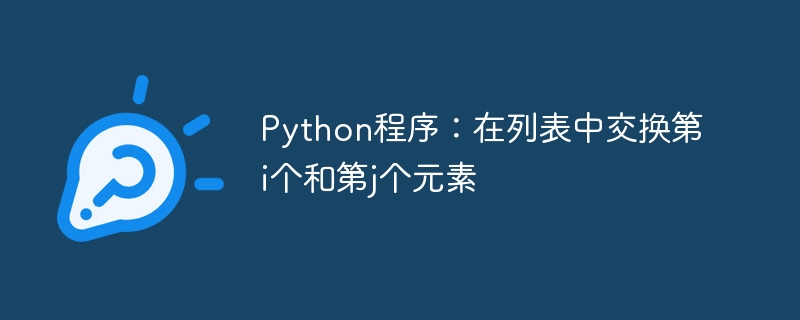Python程序:在列表中交换第i个和第j个元素

In Python, lists are versatile data structures that allow us to store and manipulate collections of items. There may be situations where we need to interchange or swap the positions of elements within a list. In this blog post, we will explore how to write a Python program to swap the i'th and j'th elements in a list.
理解问题
当前的任务是开发一个Python程序,它以列表作为输入,并交换列表中第i个和第j个元素的位置。例如,给定列表[1, 2, 3, 4, 5],如果我们想要交换索引为1和索引为3的元素,程序应该返回[1, 4, 3, 2, 5],其中元素2和4的位置被交换。
Approach and Algorithm
要解决这个问题,我们可以按照逐步的步骤进行操作−
Take the list and the indices i and j as input.
从列表中检索索引为 i 和 j 的元素。
将索引为 i 的元素分配给一个临时变量。
将索引为i的元素替换为索引为j的元素。
Replace the element at index j with the temporary variable.
Return the modified list with the swapped elements.
通过采用这种方法,我们可以有效地交换列表中的第i个和第j个元素。
在下一节中,我们将深入探讨实现细节,提供一个逐步指南,介绍如何编写Python程序来交换列表中第i个和第j个元素。
实施
现在我们已经理解了问题,并且有了一个解决方案,让我们深入了解Python程序中交换列表中第i个和第j个元素的实现细节。
Here's a step-by-step guide on how to write the program −
Define a function, let's call it swap_elements, that takes three parameters: the list, i, and j.
Inside the function, retrieve the elements at indices i and j from the list using indexing.
将索引为i的元素分配给一个临时变量,以保留其值。
将索引为i的元素替换为索引为j的元素。
Replace the element at index j with the temporary variable, which holds the original value of the element at index i
返回修改后的列表。
Here's the Python code that implements the above steps −
def swap_elements(lst, i, j):
lst[i], lst[j] = lst[j], lst[i]
return lst
In this code snippet, we utilize the power of Python's multiple assignment feature to swap the elements. By assigning lst[j] to lst[i] and lst[i] to lst[j] in a single line, we achieve the desired swap.
Now, let's test our swap_elements function with a sample input to validate its functionality −
Example
的中文翻译为:示例
my_list = [1, 2, 3, 4, 5]
i = 1
j = 3
result = swap_elements(my_list, i, j)
print("Modified List:", result)
输出
当您运行此代码时,您应该看到以下输出 −
Modified List: [1, 4, 3, 2, 5]
在下一节中,我们将使用额外的示例来测试该程序,以展示其功能。
Example
的中文翻译为:示例
my_list = [10, 20, 30, 40, 50]
i = 2
j = 4
result = swap_elements(my_list, i, j)
print("Modified List:", result)
Output
[10, 20, 50, 40, 30]
Example
的中文翻译为:示例
my_list = ['a', 'b', 'c', 'd']
i = 0
j = 3
result = swap_elements(my_list, i, j)
print("Modified List:", result)
Output
['d', 'b', 'c', 'a']
Discussion and Further Enhancements
尽管我们开发的Python程序成功地在列表中交换了第i个和第j个元素,但是有必要意识到潜在的限制,并探索进一步改进或扩展的机会。
Limitations
The program assumes that the indices i and j are valid and within the range of the list. If the indices are out of bounds, it may result in an IndexError. Handling such cases can be an improvement to consider.
The program only swaps the elements at the specified indices. If there are duplicate elements in the list and we want to swap all occurrences of a particular element, the program would need to be modified accordingly.
可能的增强和扩展
Error Handling − To enhance the program's robustness, we can add error handling mechanisms to handle invalid indices or other potential exceptions gracefully. This can provide better user experience and prevent unexpected program crashes.
User Interaction − We can expand the program to interactively prompt the user to enter the list, indices, and perform the swap operation. This can make the program more user-friendly and versatile.
交换多个元素 − 如前所述,如果存在重复元素并且我们想要交换特定元素的所有出现次数,我们可以修改程序以满足此类要求。这可能涉及遍历列表并在遇到所需元素时执行交换。
结论
我们已成功开发了一个Python程序,用于在列表中交换第i个和第j个元素。我们讨论了实现细节,提供了代码片段,使用示例输入测试了程序,并探索了进一步改进的可能性。通过理解问题,利用算法和实现程序,我们可以轻松地操作列表中元素的位置,以满足我们的要求。
以上是Python程序:在列表中交换第i个和第j个元素的详细内容。更多信息请关注PHP中文网其他相关文章!

热AI工具

Undresser.AI Undress
人工智能驱动的应用程序,用于创建逼真的裸体照片

AI Clothes Remover
用于从照片中去除衣服的在线人工智能工具。

Undress AI Tool
免费脱衣服图片

Clothoff.io
AI脱衣机

Video Face Swap
使用我们完全免费的人工智能换脸工具轻松在任何视频中换脸!

热门文章

热工具

记事本++7.3.1
好用且免费的代码编辑器

SublimeText3汉化版
中文版,非常好用

禅工作室 13.0.1
功能强大的PHP集成开发环境

Dreamweaver CS6
视觉化网页开发工具

SublimeText3 Mac版
神级代码编辑软件(SublimeText3)
 Python中的自然语言处理实例:命名实体识别
Jun 09, 2023 pm 10:52 PM
Python中的自然语言处理实例:命名实体识别
Jun 09, 2023 pm 10:52 PM
Python是一门功能强大的编程语言,其生态系统中有许多自然语言处理(NLP)相关的库和工具。命名实体识别(NamedEntityRecognition,简称NER)是NLP中很重要的一个任务,它能够识别文本中的命名实体,如人名、地名、组织机构名等。在本文中,我们将介绍如何使用Python中的NER库进行命名实体识别的实例。安装NER库我们将使用Pyt
 Python 2.x 中如何使用calendar模块进行日历生成和处理
Jul 30, 2023 pm 07:54 PM
Python 2.x 中如何使用calendar模块进行日历生成和处理
Jul 30, 2023 pm 07:54 PM
Python2.x中如何使用calendar模块进行日历生成和处理在Python中,提供了一个很方便的模块来生成和处理日历,那就是calendar模块。无论是在学习编程、处理时间相关问题,还是实际应用中需要生成特定日期的日历,calendar模块都非常实用。本文将介绍如何在Python2.x中使用calendar模块进行日历生成和处理,并附上代码示例。
 Python程序判断给定矩阵是否为稀疏矩阵
Sep 05, 2023 pm 02:57 PM
Python程序判断给定矩阵是否为稀疏矩阵
Sep 05, 2023 pm 02:57 PM
矩阵是一个矩形数组,其中一组数字按行和列排列。它被称为mXn矩阵,其中m和n是维度。如果矩阵包含的非零元素数量少于零元素,则称为稀疏矩阵。[0,0,3,0,0][0,1,0,0,6][1,0,0,9,0][0,0,2,0,0]上面的矩阵是4X5矩阵,这里大部分数字都是零。只有少数元素非零,因此我们可以将其视为稀疏矩阵。要检查给定矩阵是否是稀疏矩阵,我们需要比较元素和零的总数。如果零元素的个数超过矩阵中元素的一半。那么我们可以将给定的矩阵称为稀疏矩阵。(m*n)/2让我们讨论一下确定给定矩阵是否为
 Python 2.x 中如何使用zipfile模块创建和解压ZIP文件
Aug 01, 2023 pm 02:46 PM
Python 2.x 中如何使用zipfile模块创建和解压ZIP文件
Aug 01, 2023 pm 02:46 PM
Python2.x中如何使用zipfile模块创建和解压ZIP文件简介:ZIP文件是一种常用的归档文件格式,常用于压缩和打包文件和文件夹。Python提供了zipfile模块来创建和解压ZIP文件,本文将介绍如何在Python2.x中使用zipfile模块进行ZIP文件的创建和解压。安装:Python2.x默认情况下已经
 Python程序:在列表中交换第i个和第j个元素
Sep 17, 2023 am 09:05 AM
Python程序:在列表中交换第i个和第j个元素
Sep 17, 2023 am 09:05 AM
在Python中,列出了允许我们存储和操作项目集合的通用数据结构。在某些情况下,我们可能需要在列表中互换或交换元素的位置。在这篇博文中,我们将探索如何编写Python程序来交换它们
 C语言和Python:哪个更难学习?
Mar 22, 2024 am 09:48 AM
C语言和Python:哪个更难学习?
Mar 22, 2024 am 09:48 AM
C语言和Python:哪个更难学习?近年来,编程语言的学习逐渐成为了一种趋势。在众多编程语言中,C语言和Python可以说是最受关注的两种语言之一。C语言是一种底层语言,直接操作内存,执行效率高;Python则是一种高级语言,代码简洁易读。那么,C语言和Python究竟哪个更难学习呢?C语言是一种结构化语言,语法规则严谨,需要程序员自行管理内存,在编写程序时
 深入了解Python的本质:探讨Python在不同领域的广泛应用
Mar 25, 2024 pm 04:45 PM
深入了解Python的本质:探讨Python在不同领域的广泛应用
Mar 25, 2024 pm 04:45 PM
Python作为一种简单易学、功能强大的编程语言,在科学计算、Web开发、人工智能等领域有着广泛的应用。本文将探讨Python在不同领域的应用,并给出具体的代码示例,以帮助读者更深入了解Python的本质。首先,在科学计算领域,Python凭借其丰富的科学计算库如NumPy、SciPy、Pandas等成为了研究人员们的首选。下面是一个利用NumPy库进行矩阵
 Flask和Atom集成: Python web应用程序开发技巧(第五部分)
Jun 17, 2023 pm 03:37 PM
Flask和Atom集成: Python web应用程序开发技巧(第五部分)
Jun 17, 2023 pm 03:37 PM
Flask和Atom集成:Pythonweb应用程序开发技巧(第五部分)随着科技的发展,Web应用程序已成为人们日常生活中必不可少的一部分。Python是一种高级编程语言,具有易读易懂的语法和广泛的应用范围,因此在Web开发领域也备受欢迎。Flask是一款轻量级的PythonWeb应用程序框架,拥有灵活的扩展性和易学易用的特点。Atom则是一个高度可定






